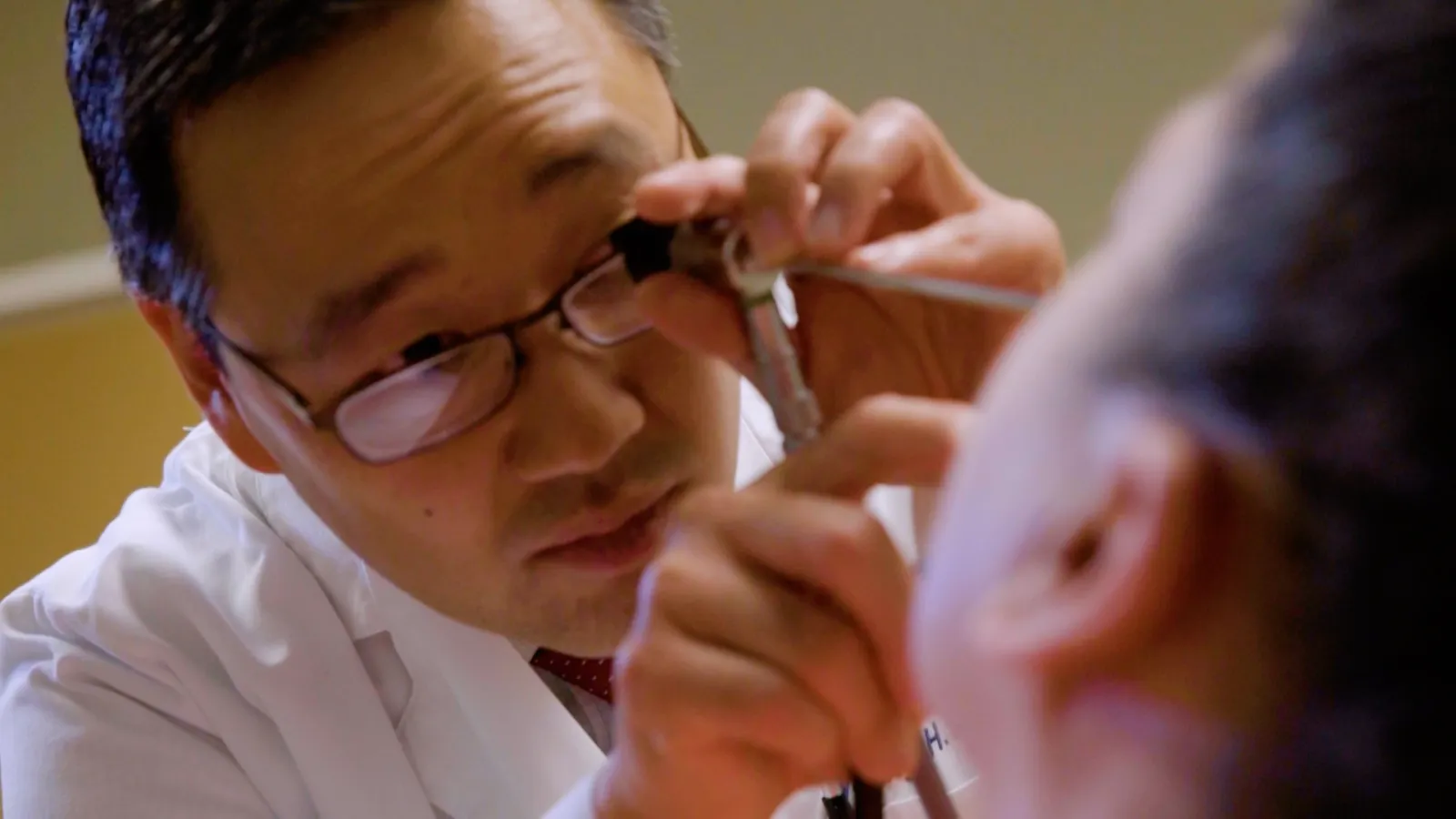Chronic sinus issues can feel like an endless cycle — congestion, pressure, infections, repeat. If you've spent months (or years) battling sinus pain that just won't quit, it's natural to wonder: Is surgery my only option?
The answer is: not necessarily.

At ENT of Georgia South, we help patients every day who are looking for long-term sinus relief without jumping straight to surgery. Many people find lasting improvement through non-surgical, in-office treatments and customized care plans, guided by our ENT specialists.
Let's explore the options and better understand when surgery might actually be the right next step as chronic sinus disease treatment.
What Is Chronic Sinusitis?
Chronic sinusitis is more than just a bad cold. It's a condition where the sinuses stay inflamed for 12 weeks or longer, often with symptoms like:
- Nasal congestion or blockage
- Facial pressure or pain
- Post-nasal drip or thick mucus
- Trouble breathing through the nose
- Loss of smell or taste
- Recurring sinus infections
If you've been treating these symptoms on your own — or with repeated antibiotics from urgent care — you may be managing the symptoms without treating the root cause.
Why Over-the-Counter Relief Often Falls Short
Many patients come to us after trying everything on the pharmacy shelf: sprays, rinses, antihistamines, decongestants. These may offer temporary relief, but they don't address the underlying issue. That could be inflammation, an undiagnosed allergy, or even an anatomical problem like a deviated septum or narrowed sinus openings. Paranasal sinus disease treatment requires a customized approach.
Instead of cycling through medications that don't stick, we offer a better path: real answers and personalized ENT care.
Non-Surgical Options That Do Work
We start by looking at what's really causing the sinus blockage — and then we build a treatment plan around that. Many of our patients improve without needing surgery, thanks to these in-office, non-invasive options. Learn more about alternatives to sinus surgery.
Allergy Testing and Immunotherapy
Did you know that untreated allergies are a major cause of chronic sinus problems?
If your immune system is reacting to dust, pollen, mold, or pet dander, your sinuses may stay inflamed year-round—even if you don't feel itchy or sneezy. That chronic inflammation makes it hard for the sinuses to drain properly.
At ENT of Georgia South, we offer in-office allergy testing to identify exactly what's triggering your symptoms. If allergies are contributing to your sinus issues, we may recommend allergy immunotherapy—a treatment that helps your body build long-term tolerance to allergens through regular injections or under-the-tongue drops.
Allergy treatment isn't just about managing symptoms—it can help solve the inflammation problem at the source.
Balloon Sinuplasty (In-Office Procedure)
If your sinuses are blocked but you want to avoid surgery in the operating room, balloon sinuplasty might be the ideal solution.
This minimally invasive procedure is done right in our office under local anesthesia. We guide a small balloon into the narrowed sinus openings, inflate it gently to widen the space, and then remove it—no cutting, no tissue removal.
Patients love it because:
- It's quick—usually under 30 minutes
- Recovery time is minimal (most return to normal activities the next day)
- It's safe and effective for the right candidates
- It can provide long-lasting sinus relief without general anesthesia or incisions
Balloon sinuplasty has helped thousands of patients finally breathe easier—and avoid repeated sinus infections, headaches, and pressure.
Radiofrequency Treatments for Better Nasal Breathing
If your chronic sinus symptoms include nasal blockage, snoring, or difficulty breathing—especially at night—you may be dealing with nasal airway obstruction. A common cause? Enlarged nasal turbinates—structures inside the nose that can swell due to allergies, colds, or chronic inflammation.
At ENT of Georgia South, we offer a cutting-edge, non-surgical radiofrequency treatment to address this problem—right in the office.
This procedure gently applies radiofrequency energy to the enlarged tissue, causing it to shrink and open up your nasal passages over time. Most patients report easier breathing within a few weeks—and best of all, there's no cutting, no packing, and very little downtime.
Benefits of radiofrequency turbinate reduction include:
- In-office procedure with local anesthesia
- Fast recovery (usually back to normal activity the next day)
- No incisions or stitches
- Long-lasting improvement in nasal airflow
If you've tried decongestants or sprays that never quite work, this minimally invasive treatment may finally give you lasting relief—and help you sleep, exercise, and breathe with ease again.
Image-Guided CT Scans and Personalized Evaluation
One of the biggest advantages of seeing an ENT specialist is having your care guided by imaging and expert analysis.
At ENT of Georgia South, we often use low-radiation, in-office CT scans to see exactly what's going on in your sinus cavities. This helps us spot:
- Blocked or narrowed sinus passages
- Hidden infections
- Nasal polyps
- Anatomical issues that could be corrected
- Inflammation patterns that might not show up on physical exam alone
From there, we build a care plan that fits your unique anatomy and needs, whether that means observation, in-office procedures, allergy treatment, or a discussion about surgical options.
When Surgery Might Be the Right Move
We never rush patients into surgery. But if non-surgical care doesn't provide lasting relief — or if your sinus CT shows severe blockage, polyps, or structural issues — then surgery may offer the best outcome, and there are various types of endoscopic sinus surgery.
Modern endoscopic sinus surgery is far less invasive than you might expect. It's performed through the nostrils using a tiny camera and precise tools, often with no external incisions. Recovery is typically smooth, and most patients experience life-changing improvements in breathing
We may recommend endoscopic sinus surgery if:
- You've tried months of medical therapy with little or no relief
- You have structural issues (like a deviated septum or blocked sinus openings)
- You suffer from recurrent infections despite treatment
- CT imaging shows severe inflammation or sinus obstruction
Modern sinus surgery is less invasive than ever, with most procedures done through the nose using a tiny camera and precise tools. Recovery is typically faster than people expect, and many patients feel better within weeks.
At ENT of Georgia South, we don't recommend surgery unless we're confident it will make a real difference in your quality of life.
Which Chronic Sinusitis Treatment Is Best for You?
There's no one-size-fits-all answer. Some patients do great with nasal sprays and rinses alone. Others benefit from in-office procedures like balloon sinuplasty. And for more complex cases, surgery may offer the best chance at long-term relief.
The key is working with a team that listens to your symptoms, understands your medical history, and builds a treatment plan around you — not just your CT scan.
Encouragement for the Journey
Chronic sinusitis can be frustrating, exhausting, and even isolating, but it's not something you have to live with forever. Whether you're looking for relief from your fourth sinus infection this year or tired of waking up congested every morning, there's help available.
At ENT of Georgia South, we're not just treating your sinuses — we're helping you breathe, sleep, and feel like yourself again.
Ready to Find Relief?
If you're wondering whether non-surgical treatment can help your chronic sinus symptoms, we're here to guide you. Schedule a consultation today, and let's talk about a plan that works for your lifestyle, your schedule, and your sinuses.

